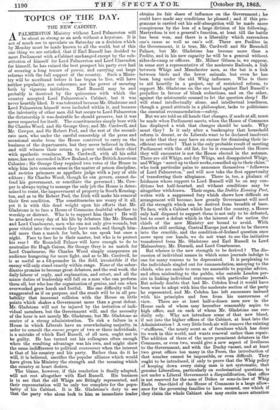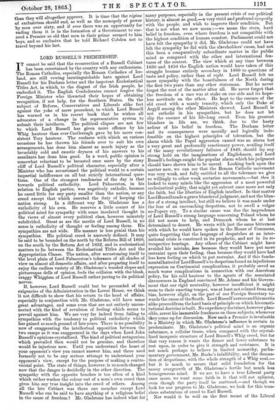TOPICS OF THE DAY.
THE NEW CABINET.
APALMERSTON Ministry without Lord Palmerston will be about as strong as an arch without a keystone. It is not of much use to speculate on Saturday on a decision which by Monday must be made known to all the world, but of this one thing we are satisfied, that if Earl Russell has decided to meet Parliament with a Cabinet unchanged except by the sub- stitution of himself for Lord Palmerston and Lord Clarendon for himself, he has ruined the best prospect his party ever had of securing a long tenure of power, and carrying out large reforms with the full support of the country. Such a Minis- try will be moribund before it has begun to live, will have neither popularity, nor coherence, nor the power of securing both by vigorous initiative. Earl Russell may be and probably is deceived by the quiescence with which the country accepted Lord Palmerston's Cabinet, but it was never heartily liked. It was tolerated because Mr. Gladstone and Lord Palmerston himself were included within it, and because the inferiority of other men did but secure to Lord Palmerston the dictatorship it was desirable he should preserve, but it was never respected for itself. The constituencies simply bore with Sir Charles Wood, and Sir George Grey, and Mr. Cardwell, and Mr. Cowper. and Sir Robert Peel, and the rest of the second- rate men, who under the careful censorship of the press and occasional snubs from the House contrived to carry on the business of the departments, but they never believed in them, and will witness their return to power without their chief with apathetic weariness. Mr. Cardwell, with all his solid sense, has not succeeded in New Zealand, or the British American Colonies ; Sir George Grey required two votes of the House to whip him into common sense in the matter of prison discipline, and re-tries prisoners as appellate judge with a jury of able editors ; Sir Charles Wood, though he can govern, cannot de- fend his government, or conciliate the governed ; Mr. Cow- per is always trying to manage the only job the House is deter- mined to resist, the improvement of property in South Kensing- ton, and as to Sir Robert Peel, the Irish will make his removal their first condition. The constituencies are weary of it all, yet it is with this dead weight upon his efforts that Mr. Gladstone is to face a House of Commons doubtful whether to worship or distrust. Who is to support him there He will be attacked every day of his life by debaters like Mr. Disraeli and Lord Cranbourne, men who can not only give wounds, but pour vitriol into the wounds they have made, and though him- self more than a match for both, he can speak but once a night. Face to face he is their master, but who is to protect his rear ? Sir Bounden Palmer will have enough to do to neutralize Sir Hugh Cairns, Sir George Grey is no match for Lord Cranbourne, Sir Charles Wood simply exasperates an audience hungering for more light, and as to Mr. Cardwell, he is as useful as a 64-pounder in the field, irresistible if the enemy will only stand exactly within range. None of the subor- dinates promise to become great debaters, and the real work, the daily labour of reply, and explanation, and retort, and all the minor duties of leadership will fall on a man who can perform them all, but who has the organization of genius, and can when overworked grow harsh and fretful. His one difficulty will be exaggerated as if on purpose, and the result will be in all pro- bability that incessant collision with the House on little points which shakes a Government more than a great defeat. Mr. Gladstone will not be injured by the irritation of indi- vidual members, but the Government will, and the necessity of the hour is not merely Mr. Gladstone, but Mr. Gladstone as centre of a strong administration. To risk a failure in a House in which Liberals have an overwhelming majority, in order to consult the anzour.propre of two or three individuals, is a mistake of which Earl Russell, of all men, ought not to be guilty. He has turned out his colleagues often enough when the resulting advantage was his own, and might show the same indifference to political convenance when the interest is that of his country and his party. Rather than do it he will, it is believed, sacrifice the popular alliance which would have given his Ministry the strength and the meaning which the country at heart desires.
The blame, however, if this resolution is finally adopted, will not rest altogether with Earl Russell. His business is to see that the old Whigs are fittingly represented, and their representation will be only too complete for the popu- larity of his Cabinet. It is Mr. Gladstone's duty to see that the party who alone look to him as immediate leader obtains its fair share of influence on the Government ; he could have made any conditions he pleased ; and if this pro- gramme is carried out his self-abnegation will be made more conspicuous by the loss of a large division of his following-. Martyrdom is not a general's function, at least till the battle has been won, and there is a liberality which surrenders one's cause as well as one's self. There are Peelites iii the Government, it is true, Mr. Cardwell and Sir Roundell Palmer, but Mr. Gladstone has become more than a Peelite, and in his new capacity he will be a general without aides-de-camp or officers. Mr. Milner Gibson is, we suppose, in some sort a representative of the moderate Radicals, a link between Whigs and Manchester men, as the bat is a link between birds and the lower animals, but even he has been long under the old Whig influence. Who is there to aid heartily in a project, say of restricted reform, to support Mr. Gladstone on the one hand against Earl Russell's prejudice in favour of blank reductions, and on the other,, against the aristocratic counsel to let the question sleep ? He will stand intellectually alone, and intellectual loneliness, though a grand attitude in a philosopher, lacks to politicians the essential recommendation—safety.
But we are told on all hands that changes, if made at all, must be made when Parliament meets, when the House of Commons has displayed a wish that changes should be made. Why must they ? Is it only after a bankruptcy that household_ reform is decent, or do Liberals want to be declared insolvent in order that they may have an excuse for dismissing their in- efficient servants ? That is the only probable result of meeting Parliament with the old list, for be it remembered the House they will encounter is not the House elected in the autumn. There are old Whigs, and dry Whigs, and disappointed Whigs, and Whigs "acred up to their necks, consolled up to their chins,' who took particular pains to announce themselves "followers of Lord Palmerston, and will now take the first opportunity of transferring their allegiance. There is, too, a plIal aux of Irishmen whose support to Lord Russell will be on any con.-- ditions but half-hearted, and without conditions may be altogether withdrawn. Their organ, the Dublin Evening Post, writes with a suppressed fury which shows how difficult an arrangement will become, how greatly Government will need. all the strength which can be derived from breadth of base. To face, with a Cabinet which has tired the country, a House only half disposed to support them is not only to be defeated, but to court a defeat which in the interest of the nation the chiefs of the new Ministry are bound to avoid. With America still seething, Central Europe just about to be thrown into the crucible, and the condition-of-Ireland question once more upon our hands, we do not want to see the initiative transferred from Mr. Gladstone and Earl Russell to Lord Malmesbury, Mr. Disraeli, and Lord Cranbourne.
But whence is the new strength to be derived ? The dis- cussion of individual names in which some journals indulge is. one for many reasons to be deprecated. It is perplexing to the individuals singled out for commendation, annoying to the chiefs, who are made to seem too amenable to popular advice, and often misleading to the public, who outside London per- sist in linking individual statesmen with particular journals. But nobody doubts that had Mr. Cobden lived it would have been wise to adopt with him the moderate section of the party he represented, and Mr. Cobden has left successors imbued with his principles and free from his narrowness of view. There are at least half-a-dozen men now in the House each of whom may hereafter reasonably aspire to high office, and on each of whom Mr. Gladstone can cor- dially rely. Why not introduce some of that new blood, if not into the higher offices of the Cabinet, at least into the Administration? A very little fresh air will remove the existing "stuffiness," the musty scent as of furniture which has done its work in this world, and wants renewal rather than repair. The addition of three of the more prominent debaters in the Commons, or even two, would give a new aspect of liveliness to the Government, and with the Duchy vacant, and at least two great offices too many in the Peers, the introduction of that number cannot be impossible, or even difficult. They ought to be introduced, if only to prove that the Whig policy of keeping down every rising man is not systematic, that genuine Liberalism, particularly on ecclesiastical questions, is not under a Liberal Government a disqualification, that office is not reserved for the sons of Dukes or sons-in-law of Whig Earls. One-third of the House of Commons is a large allow- ance for the governing families to have secured, one which if they claim the whole Cabinet also may excite more attention
than they will altogether approve. It is time that the regime nf exclusivism should end, as well as the monopoly of power by men over sixty, and if ever there was an opportunity for ending them it is in the formation of a Government to suc- ceed a Premier so old that men in their prime seemed to him boys, and so exclusive that he told Richard Cobden not to travel beyond his last.































 Previous page
Previous page